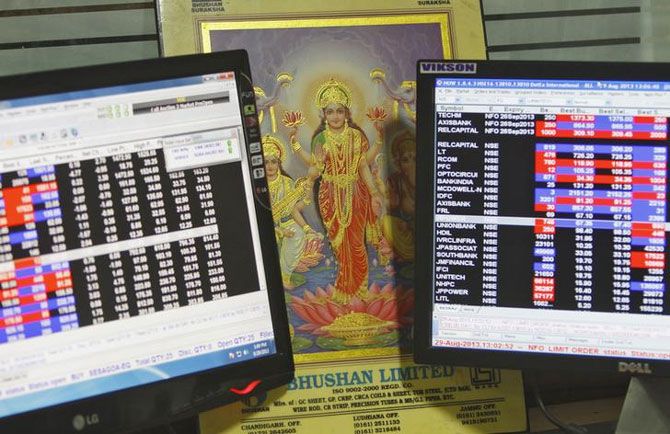'Experts are not ruling out further pain as global factors cannot insulate India from the aftermath.'
 Investors around the world got a shock on Friday when the ‘unthinkable’ became a reality as the UK voted to exit the European Union (EU).
Investors around the world got a shock on Friday when the ‘unthinkable’ became a reality as the UK voted to exit the European Union (EU).
Despite a late swing in opinion polls towards the ‘remain’ camp, British citizens voted to end the country’s membership.
The outcome shook the financial world, with financial instruments collapsing like ninepins.
As a result of the selling, the trading at Japan’s Nikkei had to be temporarily halted. The pound collapsed to a 31-year low, while safe havens such as gold soared nearly five per cent.
The Indian equity markets closed two per cent lower and the rupee touched an intra-day 68 against the dollar.
What happens next?
Now that the UK has opted out, various voices believe it could have a domino effect on other countries within the EU.
Central banks will now have to re-work their monetary and fiscal policies, with the US Federal Reserve expected to go slow with a rate hike in 2016.
According to a report by Phillip Capital, inflation in the UK could rise with the plunge in pound. This could severely impact economic growth for the next two to three years.
Jonathan Garner, chief Asia & emerging markets equity strategist, Morgan Stanley said, “Our UK economist sees protracted political and economic uncertainty, leading to a weaker pound, higher inflation, and a hit to growth. Headline indices will likely trade below our base case targets and some way towards our ‘Bear Cases’, which are set for a scenario of a two-year global recession.”
India story
Though the fall in Indian markets on Friday was lower than that of most other developed and emerging markets, experts are not ruling out further pain as global factors cannot insulate India from the aftermath. In its report on the implications of Brexit for the Indian equity market, Deutsche Bank has cautioned investors.
“India may unfortunately not be able to stay completely insulated in the event of a broad-based emerging markets sell-off contagion in the near term,” said Abhay Laijawala, research analyst.
“The emergence of new global uncertainties has increased the urgency for structural reform in India,” added the report.
Kotak Securities said in a report that India’s export exposure to the UK was limited but a fall in global demand would further weaken the exports trajectory. India received 2.2 per cent of the total FDI inflows from UK in FY16.
The report said, “While these numbers may not warrant much concern, global volatility will weigh on capital flows.”
However, analysts expect Asia and particularly India to be less impacted.
Economists at HSBC Global Research wrote that Asian economies would come out of this turmoil with only some scratches, as the trade exposure to the UK is minimal for most Asian economies.
“You might not be able to tell from current market reaction but Asia is in a reasonably strong position to withstand the latest tremors from Europe. More insulated, at least in growth terms, should be India,” Frederic Neumann, co-head of Asia economic research at HSBC said.
“For India, any adverse impact could be partly cushioned by upcoming domestic impulses to growth such as good monsoons, pay commission hikes and a likely easing of policies,” said Rob Subbaraman, managing director, chief economist and head of global markets research (Asia ex-Japan), Nomura. Morgan Stanley said India and Korea were its most preferred countries in the Asia-Pacific excluding Japan/emerging markets.
On India, Laijawala said, “By virtue of its large domestic market and relatively lesser dependence on exports compared to its emerging peers, India may outperform the emerging market universe, over the medium to longer term.”
Back home, some experts believe that Brexit has presented investors an opportunity to buy as the markets fall.
S Naren, chief investment officer, ICICI Prudential Mutual Fund said, “We see Brexit as a buying opportunity in the long term. While it is difficult to predict market movement in the short term, recent correction offers a long term buying opportunity for investors.”
“Brexit is a big event and once in a life-time. My experience says that more the uncertainty, bigger is the opportunity for stock picking,” says Motilal Oswal, chairman and managing director, Motilal Oswal Financial Services. He further urged investors to, “keep on buying at every dip. I remain optimistic and bullish for medium-to long-term.”
Sectors that cater to the domestic market are favoured investments.
Laijawala says, “Utilities, pharmaceuticals, tractors, oil marketing companies, cement and consumer staples appear to be the most insulated sectors in India.”










 © 2025
© 2025